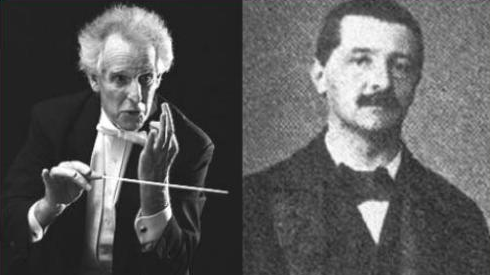Benjamin Zander conducts the Philharmonia Orchestra in definitive production

Telarc’s recently released recording of BRUCKNER’S 5TH SYMPHONY featuring the Philharmonia Orchestra led by Benjamin Zander is spectacularly grand, intensely personal, and spiritually opulent. Through meticulous detail and a carefully crafted agenda, Maestro Zander guides the four movements of the symphony in what Bruckner would recognize as a perfect procession through his “Cathedral In Sound”. Employing Direct Stream Digital technology, the recording was made at England’s Watford Colosseum, site of other grand scale projects including soundtracks for Lord of the Rings, The Sound of Music, and the Star Wars Trilogies. The result is a majestic and ultimately powerful soundscape – a Grand Tour through a boundless environment where musical architecture leads, probes, questions, and perhaps stumbles into harmony with the Divine Mind.
Accompanying the work is a most-welcome companion disc, an intimate presentation by Benjamin Zander describing the composer’s intentions, his multi-hued window of related keys, and how his symphony plays to the field of vision and existential experience within a great Gothic cathedral. Also included is an amazing diagram that sets the various parts of each movement, i.e., introduction, recapitulation, fugue, coda, etc., onto a cathedral floor plan. Most moving of all are Zander’s accounts of his father in the trenches of World War I clutching onto and silently delving into a score of Bruckner’s 5th. Thus, the somber steps past the great doors (the great questions) of the First Movement until raising-up the major and climactic resolutions at the finale – at the altar, in a blaze of light beneath the great dome – are for Zander, a hand-in-hand journey with his father, with Bruckner, and with Creation.
Benjamin Zander is well known for co-authoring the best-selling book THE ART OF POSSIBILITY, with his partner, leading psychotherapist Rosamund Zander, and for his Mahler work on TELARC. Now Benjamin Zander is back with the Philharmonia for a stunning recording of Bruckner’s powerful Symphony No. 5. He had originally planned to record Shostakovich’s Fifth Symphony, but after performing Bruckner’s Fifth with the Boston Philharmonic last season, he realized that this would be his next recording. “It is a masterpiece of staggering proportions,” he says of Bruckner’s Fifth, “one of the greatest symphonies ever written. I had a sudden strong urge to record that.” When he began preparations for the performance with the Philharmonic, he recalled a conversation he’d had many years ago with his father, who had urged him to conduct this Bruckner symphony. Once he became more familiar with the piece, he “discovered a treasure of surpassing beauty, which I wanted to share with the world,” he says. “This masterpiece is rarely performed or recorded, whereas the Shostakovich has been recorded countless times. I am hoping that through this recording and its all-important explanation disc, that we will create thousands of new fans for this great work.”
BENJAMIN ZANDER and ANTON BRUCKNER
“I found my way very slowly to Bruckner’s Fifth Symphony,” says Maestro Zander. “Likewise, my father’s letters to his parents during the First World War are recent discoveries. I only became aware of them around the time I was learning the symphony. As I studied the symphony and read the letters, I was greatly moved by the way in which my father had been sustained by the music of Bruckner during a horrific period in his early life. I came to appreciate the universality of Bruckner’s genius in a new way. I realized that I had been guilty of the same misconceptions about Bruckner that are still current among even quite knowledgeable musicians today – that his music is other-worldly and remote and that it doesn’t speak to the temper of our times. On the contrary, I see now that the huge glowing life-filled affirmations of his first movements and finales have the power to renew the human spirit even in the hardest times. And his radiant adagios, those heavenly outpourings of love, have a consoling and healing power that can touch even the most afflicted heart.”
Just after the recording session, Zander told Producer Elaine Martone that “Bruckner’s time has come! Mahler is about the individual and Bruckner is about the collective.”
Click here to listen to this recording.